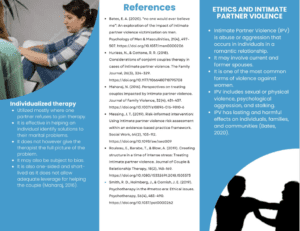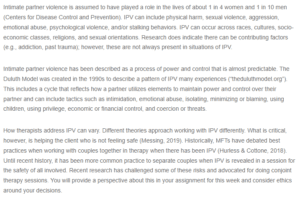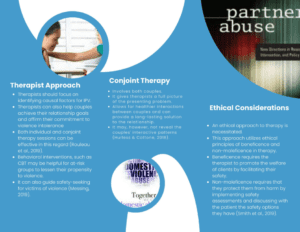Ethics and Intimate Partner Violence

ORDER A PLAGIARISM-FREE PAPER HERE
We’ll write everything from scratch
Question
Intimate partner violence is assumed to have played a role in the lives of about 1 in 4 women and 1 in 10 men (Centers for Disease Control and Prevention). IPV can include physical harm, sexual violence, aggression, emotional abuse, psychological violence, and/or stalking behaviors. IPV can occur across races, cultures, socio-economic classes, religions, and sexual orientations. Research does indicate there can be contributing factors (e.g., addiction, past trauma); however, these are not always present in situations of IPV.

Ethics and Intimate Partner Violence
Intimate partner violence has been described as a process of power and control that is almost predictable. The Duluth Model was created in the 1990s to describe a pattern of IPV many experiences (“theduluthmodel.org”). This includes a cycle that reflects how a partner utilizes elements to maintain power and control over their partner and can include tactics such as intimidation, emotional abuse, isolating, minimizing or blaming, using children, using privilege, economic or financial control, and coercion or threats.
How therapists address IPV can vary. Different theories approach working with IPV differently. What is critical, however, is helping the client who is not feeling safe (Messing, 2019). Historically, MFTs have debated best practices when working with couples together in therapy when there has been IPV (Hurless & Cottone, 2018). Until recent history, it has been more common practice to separate couples when IPV is revealed in a session for the safety of all involved. Recent research has challenged some of these risks and advocated for doing conjoint therapy sessions. You will provide a perspective about this in your assignment for this week and consider ethics around your decisions.
References
Centers for Disease Control and Prevention. Intimate Partner Violence.
Hurless, N. N., & Cottone, R.R. (2018). Considerations of conjoint couples therapy in cases of intimate partner violence. The Family Journal, 26(3):324-329.
Messing, J. T. (2019). Risk-informed intervention: Using Intimate Partner Violence Risk Assessment within an evidence-based practice framework. Social Work, 64(2), 103–112.
TheDuluthModel.org.


